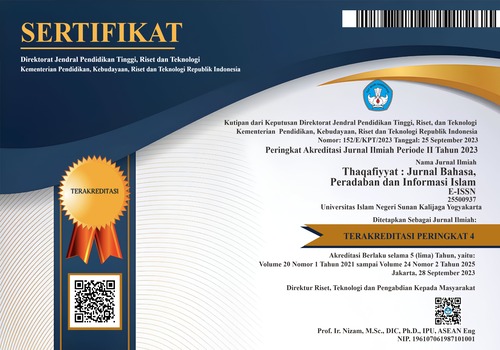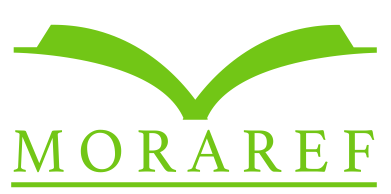KEKUASAAN, KESANTUNAN, DAN SOLIDARITAS DALAM UNGGAH-UNGGUH DI KALANGAN SANTRI OLEH IKATAN ALUMNI FUTUHIYYAH MRANGGEN DEMAK
DOI:
https://doi.org/10.14421/thaq.2018.19201Kata Kunci:
speech levels, social status, santri, social and cultural conceptAbstrak
Speech levels are a linguistic variation to show a different relationship because of the different social status between the speaker and the interlocutor. This research aims to: 1. Explain how the relationship among speech levels, power, politeness, and solidarity in the association of Alumni Futuhiyyah Mranggen, 2. Explain the social or cultural values of the student (santri) in maintaining language speech levels by the association of Alumni Futuhiyyah Mranggen. This is an explanatory descriptive study which is presenting the data by using the referral method or observation. The monitoring and the observations here were carried out by Simak Bebas Libat Cakap (SBLC) method. After that, the data are analyzed by using agih method with advanced technique of replace technique, and pragmatic equivalent method. The results of this research are presented by using formal and informal method. The results of this study indicate the use of various types of speech levels; they are ngoko, madya, and krama by the speakers with different social status. However, this research shows that adherence to a teacher or kyai exceeds the differences on social stratification. These are appropriate with the Islamic boarding house’ (pesantren) concept and terms, namely barokah/berkah, tawadhu’, irsyadul uztad, and murobbi ruhina. The alteration of social status does not affect the use of language politeness’ students and alumni of the Islamic boarding house (pesantren).Unduhan
Referensi
Arimi, Sailal. 2017. Kekuasaan dan Praktik Bahasa Kekuasaan. Materi Ajar Kuliah Variasi Bahasa Pascasarjana Ilmu Linguistik UGM. Yogyakarta: Universitas Gadjah Mada.
Chaer, Abdul., Leoni Agustina. 2014. Sosiolinguistik: Perkenalan Awal. Jakarta: Rineka Cipta.
Holmes, Janet. 1992. An Introduction to Sociolinguistics. New York: Longman Publishing.
KBBI V 0.2.0. 2016. Jakarta: Badan Pengembangan dan Pembinaan Bahasa, Kementerian Pendidikan dan Kebudayaan Republik Indonesia.
Mahsun, M.S. 2017. Metode Penelitian Bahasa: Tahapan, Strategi, Metode, dan Tekniknya. Depok: Rajawali Pers.
Mesthrie, Rajend., et.al., 2009. Introducing Sociolinguistics: Second Edition. Edinburgh: Edinburgh University Press.
Poedjosoedarmo, Soepomo. 2013. Tingkat Tutur Bahasa Jawa. Yogyakarta: Balai Bahasa Provinsi Daerah istimewa Yogyakarta. 2014.
Sudaryanto. 1993. Metode dan Aneka Teknik Analisis Bahasa: Pengantar Penelitian Wahana Kebudayaan Secara Linguistis. Yogyakarta: Duta Waca University Press.
Thomas, Linda & Shan Wareing. 2007. Bahasa, Masyarakat, & Kekuasaan. Yogyakarta: Pustaka Pelajar.
Trahutami, SI. 2016. Pemilihan Tingkat Tutur Bahasa Jawa Pada Masyarakat Desa Kladuwur Blora. Jurnal Culture, Vol.3 No.1 Mei 2016. UNDIP Semarang
Wardhaugh, R. 2010. An Introduction to Sociolinguistics. United Kingdom: Blackwell Publishing.
Unduhan
Diterbitkan
Terbitan
Bagian
Lisensi
Hak Cipta (c) 2020 Fitria Ulfa Hidayatul Rahmi

Artikel ini berlisensiCreative Commons Attribution-NonCommercial-ShareAlike 4.0 International License.
Authors who will publish with this journal agree to the following terms:
- Thaqafiyyat: Jurnal Bahasa, Peradaban dan Informasi Islam publishes all articles entirely in full text.
- It is permissible for readers to download and to use it for scientific purposes and scientific dissemination.
- Authors retain copyright and grant the journal right of first publication with the work simultaneously licensed under a Creative Commons Attribution License that allows others to share the work with an acknowledgement of the work's authorship and initial publication in this journal.
- Authors are able to enter into separate, additional contractual arrangements for the non-exclusive distribution of the journal's published version of the work (e.g., post it to an institutional repository or publish it in a book), with an acknowledgement of its initial publication in this journal.
- Authors are permitted and encouraged to post their work online (e.g., in institutional repositories or on their website) prior to and during the submission process, as it can lead to productive exchanges, as well as earlier and greater citation of published work.









